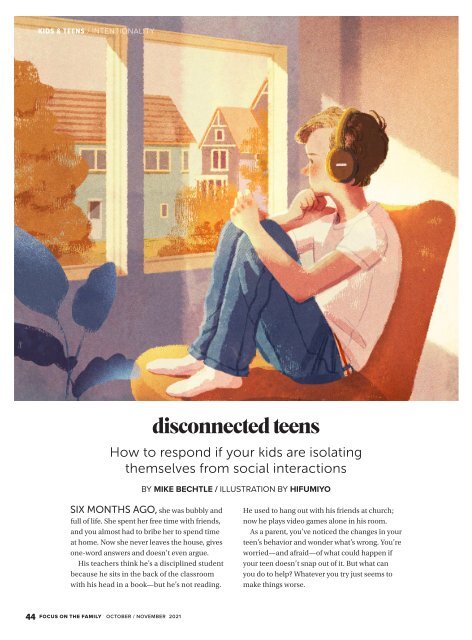Focus on the Family Magazine - October/November 2021
It can be a struggle to raise a family while balancing your work life, social life and relationships. Focus on the Family magazine is here to help! Each complimentary issue delivers fresh, practical Biblical guidance on family and life topics. Every issue comes packed with relevant advice to build up your kids, strengthen your marriage, navigate entertainment and culture, and handle common challenges you may face in your marriage and parenting journeys. Plus you'll find seasonal advice ranging from back-to-school activities to date night tips for you and your spouse.
It can be a struggle to raise a family while balancing your work life, social life and relationships. Focus on the Family magazine is here to help! Each complimentary issue delivers fresh, practical Biblical guidance on family and life topics.
Every issue comes packed with relevant advice to build up your kids, strengthen your marriage, navigate entertainment and culture, and handle common challenges you may face in your marriage and parenting journeys. Plus you'll find seasonal advice ranging from back-to-school activities to date night tips for you and your spouse.
- No tags were found...
Create successful ePaper yourself
Turn your PDF publications into a flip-book with our unique Google optimized e-Paper software.
KIDS & TEENS / INTENTIONALITY<br />
INTENTIONALITY / KIDS & TEENS<br />
WE’RE HERE TO HELP<br />
If your teen is socially isolated, c<strong>on</strong>sider talking to a counselor.<br />
<str<strong>on</strong>g>Focus</str<strong>on</strong>g> <strong>on</strong> <strong>the</strong> <strong>Family</strong> Canada offers a <strong>on</strong>e-time, complimentary<br />
c<strong>on</strong>sultati<strong>on</strong> from a Christian perspective. To reach a registered<br />
counselor, call 1-800-661-9800 weekdays between<br />
8 a.m. and 4 p.m. Pacific time.<br />
How to resp<strong>on</strong>d if your kids are isolating<br />
<strong>the</strong>mselves from social interacti<strong>on</strong>s<br />
BY MIKE BECHTLE / ILLUSTRATION BY HIFUMIYO<br />
SIX MONTHS AGO, she was bubbly and<br />
full of life. She spent her free time with friends,<br />
and you almost had to bribe her to spend time<br />
at home. Now she never leaves <strong>the</strong> house, gives<br />
<strong>on</strong>e-word answers and doesn’t even argue.<br />
His teachers think he’s a disciplined student<br />
because he sits in <strong>the</strong> back of <strong>the</strong> classroom<br />
with his head in a book—but he’s not reading.<br />
disc<strong>on</strong>nected teens<br />
He used to hang out with his friends at church;<br />
now he plays video games al<strong>on</strong>e in his room.<br />
As a parent, you’ve noticed <strong>the</strong> changes in your<br />
teen’s behavior and w<strong>on</strong>der what’s wr<strong>on</strong>g. You’re<br />
worried—and afraid—of what could happen if<br />
your teen doesn’t snap out of it. But what can<br />
you do to help? Whatever you try just seems to<br />
make things worse.<br />
More than just<br />
needing space<br />
What’s happening with your teen<br />
isn’t just moodiness or needing<br />
time al<strong>on</strong>e to recharge. It’s called<br />
social isolati<strong>on</strong>. You may have heard<br />
a lot about social isolati<strong>on</strong> during<br />
COVID-19 lockdowns. But <strong>the</strong> problem<br />
is more than kids missing <strong>the</strong><br />
chance to hang out with friends.<br />
Traumatic events, such as a breakup,<br />
bullying, an embarrassing failure,<br />
rejecti<strong>on</strong> or an inability to fit in with<br />
<strong>the</strong>ir peer group, can cause teens to<br />
deliberately disc<strong>on</strong>nect and withdraw<br />
from every<strong>on</strong>e.<br />
Isolated teens feel al<strong>on</strong>e in <strong>the</strong>ir<br />
struggles but many d<strong>on</strong>’t reach out<br />
to any<strong>on</strong>e for help—not even <strong>the</strong>ir<br />
friends. Instead, <strong>the</strong>y think <strong>the</strong>y have<br />
to figure things out <strong>on</strong> <strong>the</strong>ir own.<br />
When we see our teens spiraling<br />
downward, it’s natural to scramble<br />
for soluti<strong>on</strong>s. Impulsively, we may try<br />
every fear-based technique we can<br />
think of, such as pleading or forcing<br />
<strong>the</strong>m to reengage, using guilt or logic.<br />
Or we may try to shame <strong>the</strong>m for how<br />
<strong>the</strong>y’re impacting <strong>the</strong> family. You may<br />
get results with this approach, but it<br />
doesn’t lead to genuine c<strong>on</strong>necti<strong>on</strong>.<br />
If a fear-based approach isn’t <strong>the</strong><br />
answer, what is?<br />
A path to rec<strong>on</strong>necti<strong>on</strong><br />
First John 4:18 tells us that “perfect love<br />
casts out fear.” If love is genuine and<br />
unc<strong>on</strong>diti<strong>on</strong>al, it positi<strong>on</strong>s you as a safe<br />
pers<strong>on</strong> in your teen’s life. You become<br />
an ally instead of a repair pers<strong>on</strong>.<br />
Love is <strong>the</strong> foundati<strong>on</strong> of relati<strong>on</strong>ships<br />
and c<strong>on</strong>necti<strong>on</strong>. A fear-based<br />
approach asks, “How can I fix my<br />
teen?” but a love-based approach asks,<br />
“How can I best love my child?” Here<br />
are some ways for dem<strong>on</strong>strating a<br />
love-based approach with your teen:<br />
Affirm your unc<strong>on</strong>diti<strong>on</strong>al love and<br />
support. Teens need to know how<br />
much you love and value <strong>the</strong>m, and<br />
nothing <strong>the</strong>y do can ever change that.<br />
So be intenti<strong>on</strong>al about letting your<br />
teen know that he or she is not al<strong>on</strong>e,<br />
and that you’ll work through issues<br />
toge<strong>the</strong>r. My wife and I often told our<br />
teens, “We’re not going anywhere,<br />
and you can’t make us not love you.”<br />
<str<strong>on</strong>g>Focus</str<strong>on</strong>g> <strong>on</strong> active listening. When a<br />
teen is isolating, <strong>the</strong> most important<br />
thing you can do is listen. To get your<br />
teen talking, show genuine curiosity<br />
and ask open-ended questi<strong>on</strong>s. When<br />
a c<strong>on</strong>versati<strong>on</strong> opens up, avoid shifting<br />
<strong>the</strong> focus to your own experiences<br />
or soluti<strong>on</strong>s.<br />
Instead, seek to understand what<br />
your teen is thinking and feeling.<br />
Teens often feel ashamed or guilty for<br />
having negative thoughts or emoti<strong>on</strong>s,<br />
so let your teen know it’s normal.<br />
D<strong>on</strong>’t panic if your teen says things<br />
like “I hate my life.” Just keep listening<br />
and express your love and support.<br />
Make c<strong>on</strong>necti<strong>on</strong>, not correcti<strong>on</strong>,<br />
<strong>the</strong> goal. When our s<strong>on</strong> would isolate,<br />
he became defensive and even<br />
more withdrawn if we tried correcting<br />
him or using logic to snap him out<br />
of it. Simply being present in his pain<br />
opened a door for soluti<strong>on</strong>s.<br />
By focusing <strong>on</strong> a love-based c<strong>on</strong>necti<strong>on</strong>,<br />
you can build trust and<br />
create a safe space for your teen to<br />
talk about issues. Isolated teens often<br />
feel trapped and powerless, but we<br />
can restore hope by helping <strong>the</strong>m<br />
identify <strong>on</strong>e issue that’s important to<br />
<strong>the</strong>m and exploring tiny steps toward<br />
a soluti<strong>on</strong>. Letting teens come up<br />
with <strong>the</strong>ir own soluti<strong>on</strong>s gives <strong>the</strong>m a<br />
sense of ownership.<br />
As you love your teen toward c<strong>on</strong>necti<strong>on</strong>,<br />
invite God into <strong>the</strong> healing<br />
process by praying for your child daily.<br />
He loves our teens more than we do,<br />
and He knows how to reach <strong>the</strong>m! •<br />
Mike Bechtle, Ph.D., is a writer, public speaker<br />
and senior c<strong>on</strong>sultant for Franklincovey. He<br />
has authored five books including Dealing<br />
With <strong>the</strong> Elephant in <strong>the</strong> Room.<br />
44<br />
FOCUS ON THE FAMILY<br />
OctOber / NOvember <strong>2021</strong><br />
OctOber / NOvember <strong>2021</strong> FOCUS ON THE FAMILY 45

















